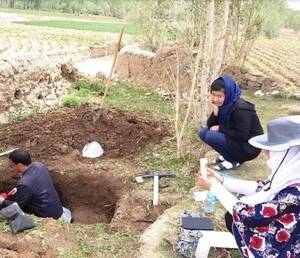Afghanistan Soil Information System

Project Symbol: TCP/AFG/3601
Afghanistan Soil Information System
Over 80 percent of Afghanistan’s population lives in rural areas, where the main income comes from agricultural production. On-farm management practices are often highly extensive, putting the country’s soils under intense pressure and causing various types of degradation. Available data on Afghanistan’s soils are limited and earlier soil surveys have lacked a systematic approach and standardized methods. Sustainable soil management requires systematic soil data collection through field surveys and the continuous monitoring of soil properties organized into an appropriate data base and soil information system (SIS). The creation of such a system, providing accurate and up-to-date soil information, is thus a high priority, as it will enable sustainable land management at farm level and assist in the efficient monitoring of land degradation processes. Once in place, the Afghanistan Soil Information System (AfSIS) will contain data and information relating to the spatial variability of soil types and soil properties integrated with such natural co-variables as climate, vegetation, geology, relief conditions, hydrology and hydrography. It can be continuously upgraded and extended with new information from the field and will serve as a reference centre for storing all valuable soil data. The aim of the project was to identify, collect, evaluate, synchronize and systematize existing soil and non-soil data into a geodatabase integrating the various data sets. The data stored will enable the application of digital soil mapping (DSM) tools and models for the prediction of spatial distribution of soil properties, the identification of possible threats and pressures, risk assessment and the implementation of measures to mitigate soil degradation processes. The project would also strengthen the technical capacities of the country’s soil science community in the conduct of systematic and standardized field and laboratory soil properties analyses.
BACKGROUND INFORMATION
Strategic Objective/Organizational Outcome: Strategic Objective 2 (SO2) Increase and improve provision of goods and services from agriculture, forestry and fisheries in a sustainable manner; SO2 output 2.4.3. Capacity development support is provided to institutions at national and regional levels to plan for and conduct data collection, analysis, application and dissemination.
Country Programming Framework Outcome: CPF No 4: Support to better natural resource management – Outcome 4.1: Enhanced capacity to improve sustainable environmental management, including in terms of policy-making capacity and information management, and ensure rehabilitation of the natural resource base.
Resource Partner: FAO CORE FUND
Reporting Period: Jan–Jun 2018
Actual EOD: 1 March 2016
Actual NTE: 28 February 2018
Total Budget: USD 497, 000
